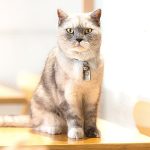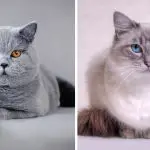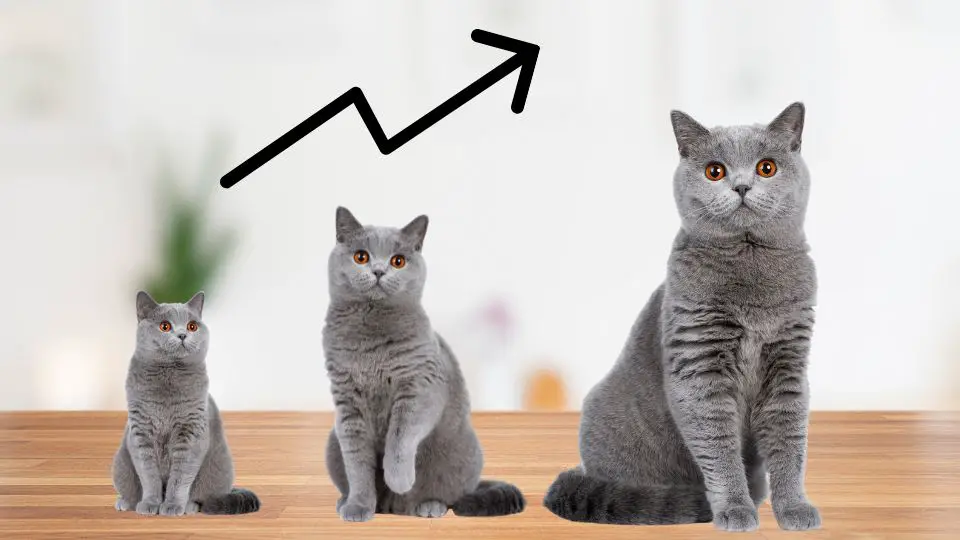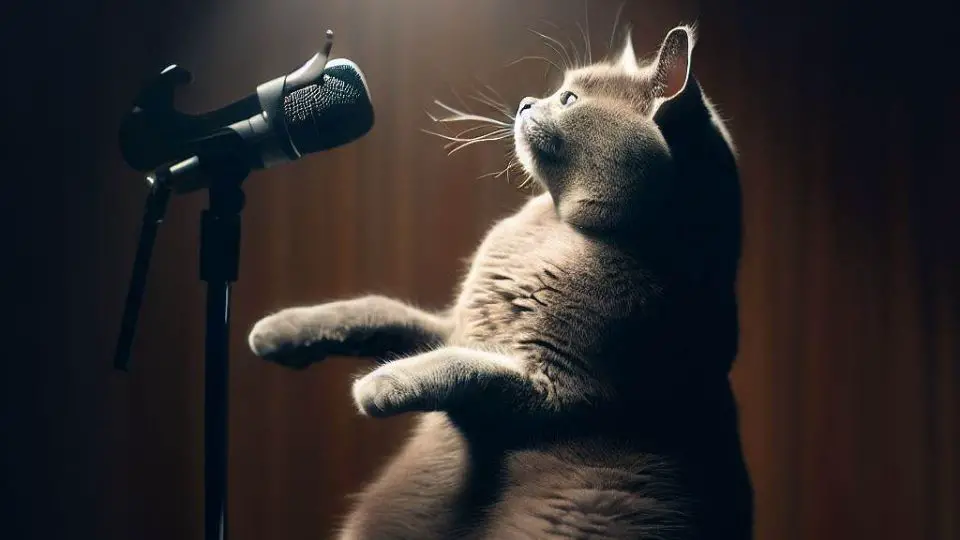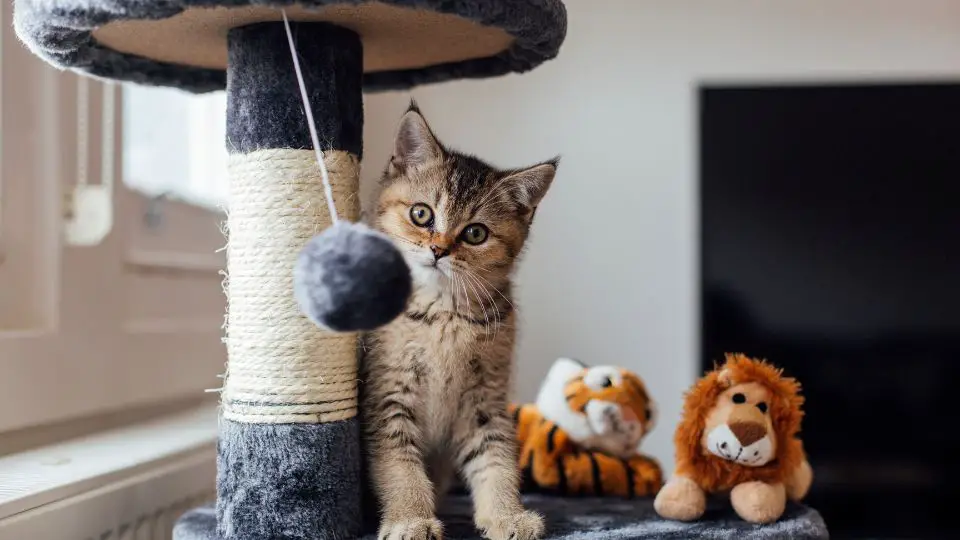As a responsible pet owner, it’s natural to be concerned if your British Shorthair cat seems to be hungry all the time.
While these cats may have a genetic tendency towards becoming overweight, there may be underlying health issues or lifestyle factors that contribute to their constant hunger. Understanding the possible reasons for your cat’s insatiable appetite can help you provide the appropriate care and feeding routine to maintain their overall health and wellbeing.
In this article, we’ll explore the potential causes of a British Shorthair’s constant hunger and provide tips on how to manage their appetite.
Why is my british shorthair always hungry
If you find that your British Shorthair cat is always hungry, it’s important to understand that there may be several underlying factors contributing to their insatiable appetite. One reason why British Shorthairs are known for their constant hunger is their genetic tendency to become overweight. This breed is naturally large and heavy-boned, which means they require a certain amount of food to maintain their size.
Another factor that can contribute to a British Shorthair’s constant hunger is their level of activity. While they can be playful and energetic when young, they tend to become less active and lazier as they get older. This reduced activity level can lead to weight gain and an increased appetite.
It’s also important to note that British Shorthairs who have been neutered or spayed may be more prone to overeating and becoming overweight. This is because the procedure can lower their metabolic rate, making it easier for them to gain weight.
Note that, as a responsible pet owner, you should remember that just because your British Shorthair is constantly asking for food doesn’t necessarily mean they need it. It can be tempting to give in to their adorable begging and pleading, but overfeeding your cat can lead to serious health problems, such as obesity and diabetes.
So, while it’s important to address any underlying medical issues that may be causing excessive hunger, it’s equally important to carefully monitor and control your cat’s food intake to ensure they maintain a healthy weight and lifestyle.
Do British Shorthair cats eat a lot?
British Shorthair cats have a reputation for being big eaters. They are known for their love of food and can sometimes overeat if given the opportunity.
British Shorthair cats require approximately 44-53 calories per kilogram of their body weight daily. On average, a healthy British Shorthair cat does well on a 180-230 calorie diet per day, which should be distributed over two to five small meals.
Remember to monitor their food intake and make sure they don’t become overweight or obese, as this can lead to health problems. Feeding them a balanced and appropriate diet, as well as providing regular exercise and playtime, can help keep their appetite in check.
Why does my cat act like he’s starving all the time?
It’s not uncommon for cats to act like they’re starving all the time, but it’s important to determine whether it’s a behavioral issue or a medical problem. If your British Shorthair cat seems to be constantly hungry, it could be a sign of a health issue. Some common causes of overeating in cats include hyperthyroidism, diabetes, and cancer.
Hyperthyroidism is a condition where the thyroid gland produces too much thyroid hormone. This can cause an increase in appetite and weight loss, despite the cat eating more than usual. Diabetes, on the other hand, can cause increased hunger and thirst, along with weight loss and lethargy. And cancer can cause a variety of symptoms, including loss of appetite or increased appetite.
Aside from medical issues, there are other reasons why a cat may seem constantly hungry. It could be that they’re not getting enough food, they’re bored and looking for something to do, or they’re simply a breed that requires more food than others.
If you’re concerned about your cat’s feeding habits, it’s important to talk to your veterinarian. They can perform a physical exam, run some tests, and determine if there’s an underlying health issue that needs to be addressed. They can also provide advice on how much to feed your cat and what type of food is best for their individual needs.
Here are some tips to prevent or stop your cat from begging for food:
- Stick to a feeding schedule: Feed your cat on a regular schedule, preferably at the same time every day. This will help them get used to a routine and reduce the urge to beg for food.
- Measure portions: Use a measuring cup or scale to portion out your cat’s food. This will help you control the amount of food they consume, reducing the chance of overfeeding.
- Avoid feeding table scraps: Avoid giving your cat table scraps or human food. This can create bad habits and encourage begging behavior.
- Provide enrichment: Provide your cat with toys, scratching posts, and other forms of enrichment to keep them entertained and distracted from food.
- Ignore begging behavior: If your cat begs for food, ignore the behavior and do not reward it with treats or extra food. This will help them learn that begging is not an effective way to get what they want.
- Offer water: Sometimes cats may mistake thirst for hunger. Ensure that your cat has access to clean and fresh water at all times.
- Check for health issues: If your cat’s begging behavior continues despite following these tips, it may be a sign of an underlying health issue. Schedule a visit with your veterinarian to rule out any medical issues.
Possible reasons for increased appetite
Here are some possible reasons why your cat may be eating more than usual:
Health issues
A sudden increase in appetite could be a sign of an underlying health problem such as hyperthyroidism, diabetes, or kidney disease. If you notice other symptoms like weight loss or lethargy, it’s important to bring your cat to the vet for a check-up.
Lack of exercise
Cats who don’t get enough exercise may become bored and turn to food for entertainment. Indoor cats especially need plenty of stimulation to prevent overeating. Try providing your cat with toys, scratching posts, and playtime to keep them active.
If your cat is not interested in playing or seems lazy, there are a few things you can do to encourage exercise and increase activity:
- Create an engaging environment: Set up perches, cat trees, and toys around the house to encourage exploration and play. Try to make it a fun and stimulating environment for your cat.
- Encourage interactive play: Try to engage your cat in play by using toys that require your participation, such as a wand or laser pointer. This type of play can help stimulate your cat and get them moving.
- Food puzzles: Food puzzles can provide mental stimulation and help encourage exercise. They require your cat to work for their food, and can be a great way to keep them active and engaged.
- Outdoor access: If it is safe and appropriate for your cat, consider allowing them outdoor access. This can encourage exploration and provide opportunities for exercise.
Overfeeding
Giving your cat too much food or too many treats can lead to overeating and weight gain. Make sure you’re feeding your cat the recommended portion size based on their age, weight, and activity level. Also, be mindful of table scraps or human food, as they can be high in calories and harmful ingredients.
Tips for managing your cat’s appetite
Managing your cat’s appetite is an important part of keeping them healthy and maintaining their weight. Here are some tips to help manage your cat’s appetite:
Feeding schedule
Set a consistent feeding schedule for your cat and stick to it. Try to feed your cat at the same time every day, and avoid free-feeding, where you leave food out all the time. This can help regulate your cat’s appetite and prevent overeating.
Controlled portion sizes
Use a measuring cup or kitchen scale to ensure you are feeding your cat the appropriate portion size. This can help prevent overfeeding and maintain a healthy weight.
Here are some tips for offering controlled portion sizes to your cat:
- Measure your cat’s food: Use a measuring cup or kitchen scale to accurately measure your cat’s food portions. This will help you keep track of how much your cat is eating and ensure that you are not overfeeding them.
- Divide meals into smaller portions: Instead of feeding your cat one or two large meals per day, divide their food into smaller portions and feed them more frequently. This can help prevent overeating and reduce the risk of digestive issues.
- Don’t feed your cat table scraps: Human food is often high in fat and calories and can upset your cat’s digestive system. Stick to a high-quality cat food that is formulated to meet your cat’s nutritional needs.
- Avoid free-feeding: Leaving food out all day can lead to overeating and obesity. Instead, offer your cat controlled portions at regular meal times.
Choosing a high-quality diet
Make sure you are feeding your cat a high-quality, balanced diet that meets their nutritional needs. Look for food with high protein content and low carbohydrates.
Encouraging exercise
Regular exercise is essential for maintaining a healthy weight and keeping your cat active. Provide your cat with toys that encourage exercise, such as balls, interactive toys, and scratching posts. You can also try taking your cat for short walks on a harness and leash, or providing them with a cat tree to climb and play on.
When to seek veterinary care
If your small pet increased appetite persists despite your efforts to manage it, it’s important to seek veterinary care. Your vet can perform a physical exam and blood tests to check for underlying health issues such as hyperthyroidism or diabetes. If necessary, they may recommend medication or other treatments to manage the condition.
Additionally, if you notice any other concerning symptoms in your cat, such as vomiting, diarrhea, or changes in behavior, it’s important to seek veterinary care promptly. These symptoms could indicate a serious underlying health issue that requires immediate attention. As a responsible pet owner, it’s important to be proactive in monitoring your cat’s health and seeking veterinary care as needed to ensure they lead a happy and healthy life.
Conclusion
In conclusion, if you notice that your British Shorthair is always hungry, it’s important to address the issue promptly. While it’s normal for cats to have a healthy appetite, persistent hunger can be a sign of an underlying health issue or a problem with their diet and feeding schedule.
Be sure to monitor your cat’s eating habits, provide them with a balanced diet, and consult with your veterinarian if you have concerns about their hunger levels or weight. With proper care and attention, you can help your beloved British Shorthair maintain a healthy weight and live a long, happy life.


